Related Research Articles
The British National Party (BNP) is a far-right, British fascist political party in the United Kingdom. It is headquartered in Wigton, Cumbria, and is led by Adam Walker. A minor party, it has no elected representatives at any level of UK government. The party was founded in 1982, and reached its greatest level of success in the 2000s, when it had over fifty seats in local government, one seat on the London Assembly, and two Members of the European Parliament.
Welling is a town in South East London, England, in the London Borough of Bexley, 1.5 miles (2.4 km) west of Bexleyheath, 4 miles (6.4 km) southeast of Woolwich and 10.5 miles (16.9 km) of Charing Cross. Before the creation of Greater London in 1965, it was in the historical county of Kent.
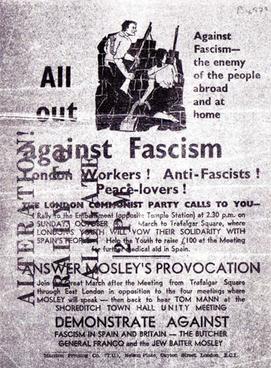
The Battle of Cable Street was a series of clashes that took place at several locations in the inner East End, most notably Cable Street, on Sunday 4 October 1936. It was a clash between the Metropolitan Police, sent to protect a march by members of the British Union of Fascists led by Oswald Mosley, and various de jure and de facto anti-fascist demonstrators, including local trade unionists, communists, anarchists, British Jews, supported in particular by Irish workers, and socialist groups. The anti-fascist counter-demonstration included both organised and unaffiliated participants.

The 1967 Hong Kong riots were large-scale anti-government riots that occurred in Hong Kong during British colonial rule. Beginning as a minor labour dispute, the demonstrations eventually escalated into protests against the colonial government. The protests were partially inspired by successful anti-colonial demonstrations in Portuguese Macau which had occurred a few months prior.
Far-right politics in the United Kingdom have existed since at least the 1930s, with the formation of Nazi, fascist and antisemitic movements. It went on to acquire more explicitly racial connotations, being dominated in the 1960s and 1970s by self-proclaimed white nationalist organisations that opposed non-white and Asian immigration. The idea stems from belief of white supremacy, the belief that white people are superior to all other races and should therefore dominate society. Examples of such groups in the UK are the National Front (NF), the British Movement (BM) and British National Party (BNP), or the British Union of Fascists (BUF). Since the 1980s, the term has mainly been used to describe those groups, such as the English Defence League, who express the wish to preserve what they perceive to be British culture, and those who campaign against the presence of non-indigenous ethnic minorities and what they perceive to be an excessive number of asylum seekers.

Kevin Gately was a student who died as the result of a head injury received in the Red Lion Square disorders in London while protesting against the National Front, a far-right, fascist political party. It is not known if the injury was caused deliberately or was accidental. He was not a member of any political organisation, and the march at Red Lion Square was his first. He was the first person to die in a public demonstration in Great Britain for at least 55 years.

The Battle of Lewisham took place on 13 August 1977, when 500 members of the far-right National Front (NF) attempted to march from New Cross to Lewisham in southeast London and various counter-demonstrations by approximately 4,000 people led to violent clashes between the two groups and between the anti-NF demonstrators and police. 5,000 police officers were present and 56 officers were injured, 11 of whom were hospitalised. 214 people were arrested. Later disturbances in Lewisham town centre saw the first use of police riot shields on the UK mainland.
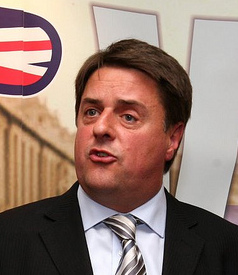
Nicholas John Griffin is a British politician who represented North West England as a Member of the European Parliament (MEP) from 2009 to 2014. He was chairman and then president of the far-right British National Party (BNP) from 1999 to 2014, when he was expelled from the party.

The English Defence League (EDL) is a far-right, Islamophobic organisation in the United Kingdom. A social movement and pressure group that employs street demonstrations as its main tactic, the EDL presents itself as a single-issue movement opposed to Islamism and Islamic extremism, although its rhetoric and actions target Islam and Muslims more widely. Founded in 2009, its heyday lasted until 2011, after which it entered a decline.
Stop Islamisation of Europe (SIOE) is a pan-European counter-jihad organisation with the stated goal of "preventing Islam from becoming a dominant political force in Europe". It is a political interest group which has been active in Denmark and has conducted anti-Islamic protests in the United Kingdom. The group originated out of the joining of the Danish group Stop Islamisation of Denmark with English anti-Islam activists.

Youth against Racism in Europe (YRE) is an anti-racist organisation founded by the Committee for a Workers' International it campaigns among young people in 16 countries in Europe. YRE was launched by an international demonstration of 40,000 people against racism, in Brussels in October 1992.
The British National Party (BNP) is a far-right political party in the United Kingdom formed as a splinter group from the National Front by John Tyndall in 1982 and was led by Nick Griffin from September 1999 to July 2014. Its current chairman is Adam Walker. The BNP platform is centred on the advocacy of "firm but voluntary incentives for immigrants and their descendants to return home", as well as the repeal of anti-discrimination legislation. It restricted membership to "indigenous British" people until a 2010 legal challenge to its constitution.
The Anti-Nazi League (ANL) was an organisation set up in 1977 on the initiative of the Socialist Workers Party with sponsorship from some trade unions and the endorsement of a list of prominent people to oppose the rise of far-right groups in the United Kingdom. It was wound down in 1981. It was relaunched in 1992, but merged into Unite Against Fascism in 2003.

Unite Against Fascism (UAF) is a British anti-fascist group.
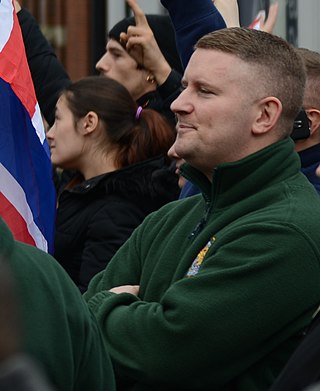
Paul Golding is a British far-right political leader who is currently the leader of Britain First.
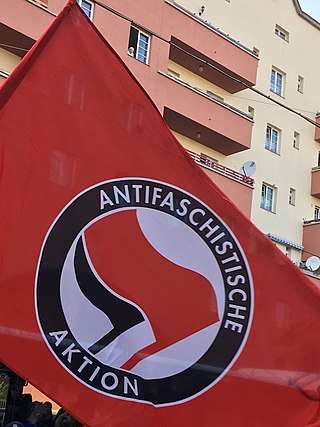
Post–World War II anti-fascism, including antifa groups, anti-fascist movements and anti-fascist action networks, saw the development of political movements describing themselves as anti-fascist and in opposition to fascism. Those movements have been active in several countries in the aftermath of World War II during the second half of the 20th and early 21st century.
The Anti-Racist Alliance (ARA) was a British anti-racist organisation formed in November 1991. It was established mainly by black activists in the Labour Party.
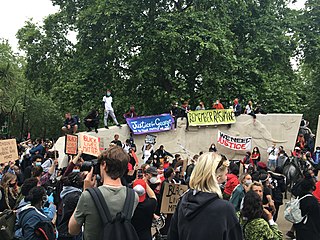
Protests were held across the United Kingdom following the murder of George Floyd, a 46-year-old African-American man, by police officers while under arrest in the United States on 25 May 2020. Immediately following his murder, protests and riots occurred in dozens of cities across the United States. Protests were staged internationally for the first time on 28 May, with a solidarity demonstration outside the United States Embassy in London. They took place during the UK COVID-19 pandemic.
The Battle of De Winton Field was a clash between the British Union of Fascists and various anti-fascist demonstrators that took place in Tonypandy, Wales, on 11 June 1936. It was the BUF's last attempt to hold a rally in Wales.
References
- ↑ Copsey, Nigel (14 August 2008). Contemporary British Fascism: The British National Party and the Quest for Legitimacy (2nd ed.). Springer. p. 47. ISBN 9780230227859 . Retrieved 4 June 2018.
- 1 2 3 4 5 6 7 8 9 Bennetto, Jason; Connett, David (17 October 1993). "Race march explodes into riot: Policeman paralysed, fighting and arrests as 25,000 head for headquarters of British National Party" . The Independent. Archived from the original on 1 May 2022. Retrieved 4 June 2018.
- 1 2 3 4 5 6 Cox, Marcia (October 2014). "In My View: Welling, 1993". Socialist Review.
- ↑ Woodward, Robert (28 March 1993). "Racially Motivated Attacks Post Sharp Increase Throughout Britain : Hate crime: Anti-fascist groups say increased activity by right-wing groups may lead to violence". Los Angeles Times.
- 1 2 3 4 5 6 7 8 Buist, Erica (29 January 2016). "Balwinder Rana at an anti-BNP march, Welling, 1993". the Guardian.
- 1 2 Goodhew, David (15 May 2017). Church Growth in Britain: 1980 to the Present. Routledge. ISBN 9781351951616 – via Google Books.
- 1 2 3 4 5 "London Police Battle Anti-Fascist Protesters". New York Times. 17 October 1993.
- ↑ Bennett, Theresa; Ovenden, Kevin (14 July 2001). "Bradford: What really happened". Socialist Worker. Retrieved 4 June 2018.
- ↑ "Police 'spied on' Stephen Lawrence family, says Guardian newspaper". BBC News. 24 June 2013.